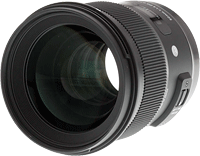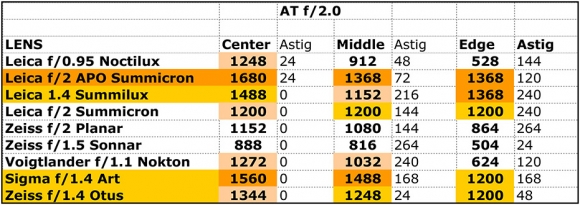Which 50mm lens is the best? Lensrentals’ Roger Cicala set out to answer this age-old question
posted Thursday, June 5, 2014 at 1:36 PM EST

In the world of lenses, and particularly in that of 50mm lenses, photographers all over the world like to get into heated debates about which one is the best. Is it Canon's 'nifty fifty' or rather Nikon's competitor? Is it an old Zeiss lens or rather a Leica Summilux? And above all: are the more expensive lenses really worth their premium price? In order to find out what's what, Lensrentals' Roger Cicala pitted a number of rangefinder and DSLR 50mm lenses against each other -- with surprising results.
The lenses included in Roger's test -- which he called preliminary because he is still working on optimizing his method -- comprised the following specimens:
- the $11,000 Leica Noctilux-M 50mm f/0.95
- the $7,350 Leica APO-Summicron-M 50mm f/2
- the $4,250 Leica Summilux-M 50mm f/1.4
- the $4,000 Zeiss Otus 55mm f/1.4
- the $2,350 Leica Summicron-M 50mm f/2
- the $1,200 Zeiss C Sonnar 50mm f/1.5 ZM
- the $1,000 Voigtländer Nokton 50mm f/1.1
- the $950 Sigma 50mm f/1.4 Art
- the $860 Zeiss Planar 50mm f/2 ZM

Each one of these lenses was put on Lensrentals' Imagemaster optical bench and tested for distortion and sharpness at infinity focus. Sharpness was measured at the center, in the middle and in the corners each, with the resulting MTF values revealing astigmatism, which makes objects appear blurred even though they are in focus. You will not be surprised to hear that in terms of pure sharpness, the super-expensive Leica APO-Summicron bested every other lens in this test. After all, Leica put all their knowledge and a ton of research into this.
Another very strong performer is Leica's Summilux according to this test, while the über-expensive Noctilux hardly did better than its much more affordable competitor, the Voigtländer Nokton. But here's the really surprising part. While the Zeiss Otus performed almost as well as the Leica Summilux, the Sigma did just as well, and that at a fraction of the price. Which makes you wonder: are the more expensive lenses really worth the extra cash?
Of course, there's a lot more to a lens than simply its performance in a lab test. But if anything, what Roger's test goes to show that more expensive doesn't automatically mean better in every way.
Read the full test over at the Lensrentals blog.